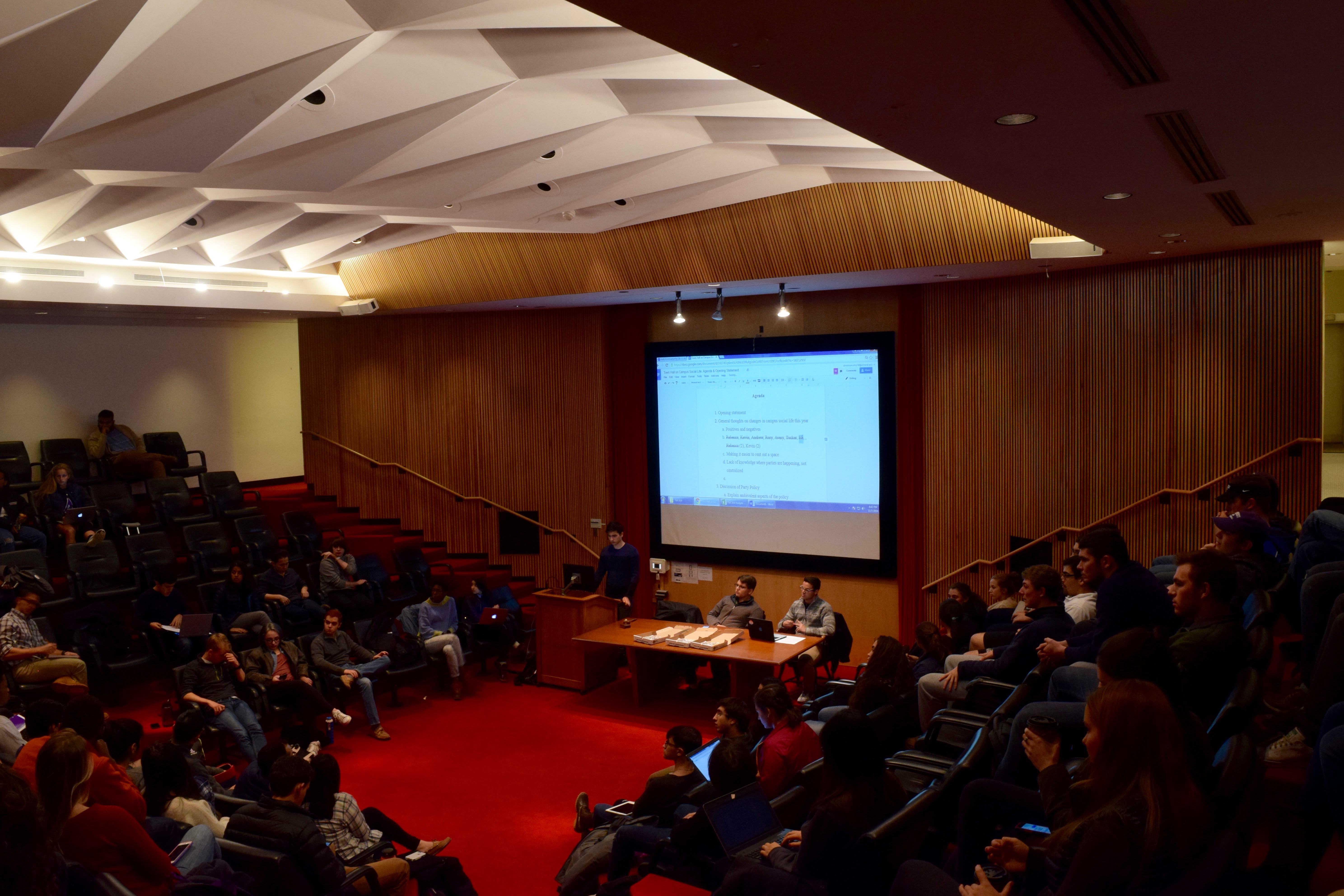

The Association of Amherst Students held a town hall on social life on campus and possible improvements on Monday, Nov. 7. The meeting, attended by nearly 100 students, primarily focused on party culture and policy.
AAS Senator Will Zaubler ’19 opened the meeting by acknowledging students’ complaints about the changes in the college’s social scene after the social dorms, a primary location for parties and other social events in years past, were torn down to make way for the new science center. A goal, he said, is to form a committee that includes at-large members from the student body. This committee would communicate students’ complaints to members of the administration.
The next item on the agenda was to solicit general thoughts on changes in social life on campus this year, both positive and negative. Students brought up concerns such as safety on weekend nights, obstacles encountered while making space reservations and the worsening divide between athletes and non-athletes.
One concern several students raised was that parties are often shut down following noise complaints called in by other students. When dorm residents call campus police with a noise complaint, an officer is obligated to investigate the source of the noise, since the student handbook states that dorm residents are entitled to quiet living spaces. While checking on the party, if officers find any violation of the student party policy — such as hard alcohol, drinking games or the absence of the registered party organizer — they may shut the party down. Previously, such violations were more difficult for police to find, as most parties were held in suites within the social dorms, which were private spaces and less accessible.
While the college maintains several spaces for social events, including the Powerhouse and the new event space in Greenway A, some students also said that the parties in these spaces were difficult to plan since a request must be made well in advance, and that they felt different.
“Nobody’s going to go to parties in the Powerhouse until it stops feeling like we’re going through TSA,” said Tasha Kim ’18, a member of the senate, referring to the frequent presence of student security at parties at the Powerhouse held by the college. Kim said that this aspect had to change “if the school really wants people to realize that the Powerhouse is a nighttime social space.”
The conversation then moved to proposing short-term solutions, particularly for noise complaints. Some ideas proposed were that certain dorms should be designated as quieter dorms or more social dorms.
Others said students should begin taking more accountability for their actions during and after parties in residential spaces.
“There’s a difference between using a space for a party … [and] having someone spill beer down an entire staircase,” said Ruben Valera ’17, a residential counselor in Lipton dormitory. “Us, as a student body, being more respectful of those spaces we use … If you’re going to use a space, don’t trash the entire dorm.”
Jenkins RC Margo Cody ’17 suggested a stronger effort to fine or punish visitors who cause damage to dormitories rather than holding residents accountable for others’ actions.
“People in Jenkins and Taplin are getting swarmed with fines, and I think the school needs to recognize that these spaces, in this transition year, are getting beaten up by this new social system,” Cody said. “This isn’t fair because, as you all know, 400 people come to Jenkins every weekend, and most of the damage done to these dorms are not done by residents. So I don’t think it’s fair that people in Jenkins and residents have to pay as much as we do for other people’s mess.”
The meeting concluded after a discussion of potential long-term changes for the future, including opening more party spaces away from residential areas and increasing the size of room draw groups.
In an interview after the meeting, Zaubler said an AAS committee on social life would be more representative of the student body, including those with athlete and non-athlete status and others involved in various student organizations on campus. The group would work with staff and administration in Student Life and Student Affairs, such as Director of Student Activities Paul Gallegos and Dean of Students Alex Vasquez, to address these issues in the long term. Vasquez was contacted for comment but had not responded at press time.
“We also want to talk about how we can better foster communication between RCs, their residents and people who are registering parties,” Zaubler said. Other feasible tasks for the near future, according to Zaubler, are designating specific dormitories as social or quiet dorms and ensuring that residents of Taplin and Jenkins, dorms that now bear the brunt of parties and social life on campus, do not have to face charges for dorm damage not caused by residents.
“It’s not that the party policy itself is bad, but it’s the way that it’s implemented and it doesn’t reflect the spaces on campus,” Zaubler said.